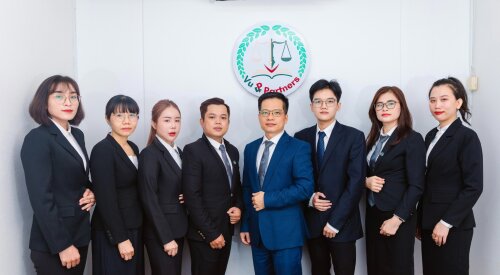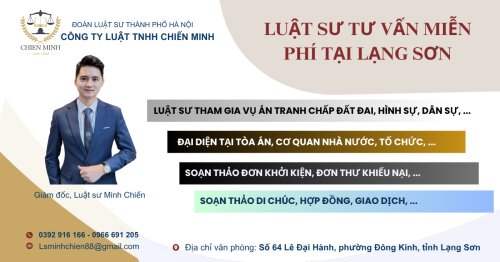Best Collaborative Law Lawyers in Vietnam
Share your needs with us, get contacted by law firms.
Free. Takes 2 min.
Free Guide to Hiring a Family Lawyer
Or refine your search by selecting a city:
List of the best lawyers in Vietnam
About Collaborative Law in Vietnam
Collaborative Law in Vietnam is a relatively new approach to resolving legal disputes, especially in family law, that emphasizes cooperation over adversarial litigation. It is designed to provide a peaceful, amicable process for separating parties to negotiate a mutually acceptable settlement with the assistance of collaboratively trained lawyers. This method encourages open communication and transparency, aiming to minimize the emotional and financial stress often associated with legal disputes. Collaborative Law in Vietnam is gradually gaining recognition as an effective way to resolve conflicts outside the courtroom.
Why You May Need a Lawyer
There are several scenarios in which seeking the advice of a lawyer practicing Collaborative Law might be beneficial in Vietnam:
- If you are going through a divorce or separation and prefer a non-adversarial process.
- For negotiating prenuptial or postnuptial agreements collaboratively.
- When dealing with child custody and support arrangements in a manner that prioritizes the well-being of the children.
- If you wish to resolve business disputes amicably without litigation.
- For estate planning and managing inheritance issues cooperatively.
Local Laws Overview
In Vietnam, the legal framework governing family law and other civil matters has specific provisions that support collaborative processes, albeit informal. While collaborative law is not explicitly codified in Vietnamese law, the Civil Procedure Code allows for alternative dispute resolutions that could align with collaborative practices. Lawyers must often adapt these frameworks creatively to fit the collaborative model. Moreover, Vietnam's increasing integration with international legal practices offers a developing interest in collaborative law approaches.
Frequently Asked Questions
1. What is Collaborative Law?
Collaborative Law is a legal process that allows parties to resolve disputes amicably with the help of trained lawyers, avoiding the adversarial nature of court proceedings.
2. Is Collaborative Law widely recognized in Vietnam?
While not as widespread as other methods, interest in Collaborative Law is increasing as more legal professionals recognize its benefits for various disputes.
3. Can Collaborative Law be used for divorce cases in Vietnam?
Yes, Collaborative Law is particularly suited for divorce cases, providing a framework for couples to negotiate terms without court involvement.
4. How does Collaborative Law differ from mediation?
Collaborative Law involves both parties having their own collaboratively trained lawyers present during negotiations, whereas mediation involves a neutral third party to facilitate discussions.
5. Are collaborative lawyers specialized in Vietnam?
Some lawyers in Vietnam are specifically trained in collaborative law techniques, but it's important to inquire about their specific experience in this area.
6. What happens if collaborative negotiations fail?
If negotiations fail, the collaborative lawyers must withdraw from the case, and parties will need to seek new representation for litigation.
7. How can I find a collaborative lawyer in Vietnam?
You can start by asking for referrals from reputable law firms or checking with local legal associations that may offer collaborative law services.
8. Is Collaborative Law more cost-effective than going to court?
Collaborative Law can be more cost-effective than litigation as it seeks to resolve disputes faster and cooperatively, potentially saving on legal fees and court costs.
9. Are there any legal documents required to start a collaborative process?
Typically, a participation agreement is signed by both parties and their lawyers, outlining the commitment to resolve the issue collaboratively.
10. What should I consider before choosing Collaborative Law?
Consider the willingness of both parties to cooperate, the complexity of the issues involved, and the availability of trained professionals in your area.
Additional Resources
If you're interested in Collaborative Law in Vietnam, consider these resources:
- The Vietnam Bar Federation, which may offer referrals to collaborative law practitioners.
- Family law clinics in Vietnam universities that may have resources for dispute resolution.
- International organizations and forums online discussing collaborative law practices in Vietnam.
Next Steps
If you decide to seek legal assistance in Collaborative Law in Vietnam, follow these steps:
- Assess whether Collaborative Law fits your situation and willingness for cooperative resolution exists between the parties involved.
- Research and select a lawyer skilled in collaborative practices either through referrals or professional directories.
- Prepare for initial consultations by gathering relevant documents and clarifying your objectives for the collaborative process.
- Formally engage your selected lawyer, ensuring agreement on fees and services.
- Sign a participation agreement to officially start the collaborative process.
Remember, the collaborative process relies heavily on mutual respect and honest communication, setting a foundation for an agreement that satisfies all parties involved.
Lawzana helps you find the best lawyers and law firms in Vietnam through a curated and pre-screened list of qualified legal professionals. Our platform offers rankings and detailed profiles of attorneys and law firms, allowing you to compare based on practice areas, including Collaborative Law, experience, and client feedback.
Each profile includes a description of the firm's areas of practice, client reviews, team members and partners, year of establishment, spoken languages, office locations, contact information, social media presence, and any published articles or resources. Most firms on our platform speak English and are experienced in both local and international legal matters.
Get a quote from top-rated law firms in Vietnam — quickly, securely, and without unnecessary hassle.
Disclaimer:
The information provided on this page is for general informational purposes only and does not constitute legal advice. While we strive to ensure the accuracy and relevance of the content, legal information may change over time, and interpretations of the law can vary. You should always consult with a qualified legal professional for advice specific to your situation.
We disclaim all liability for actions taken or not taken based on the content of this page. If you believe any information is incorrect or outdated, please contact us, and we will review and update it where appropriate.
Browse collaborative law law firms by city in Vietnam
Refine your search by selecting a city.
















